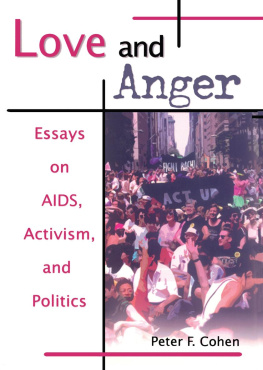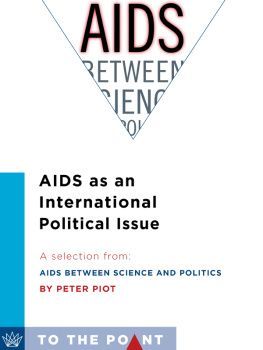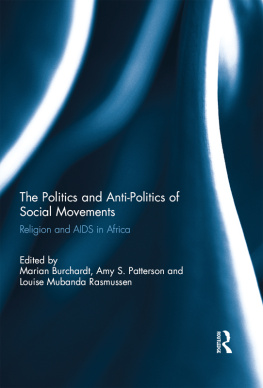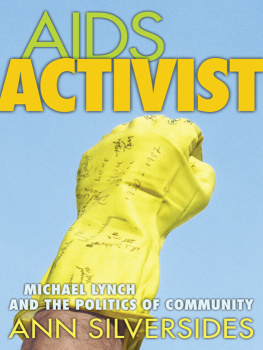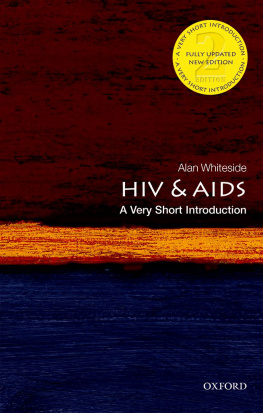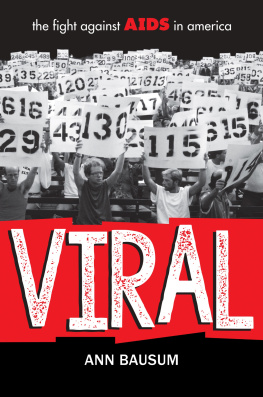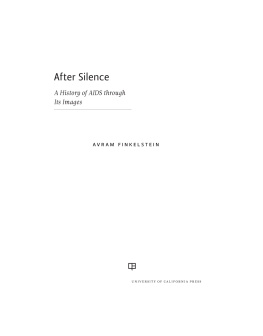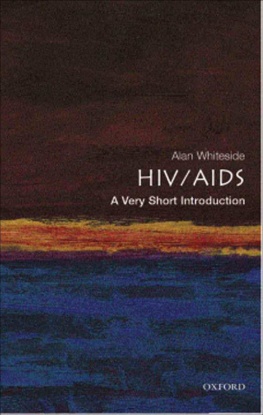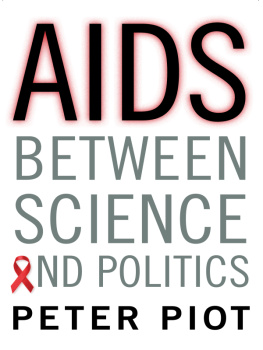Love and Anger
Essays on AIDS, Activism, and Politics
Love and Anger
Essays on AIDS, Activism, and Politics
Peter F. Cohen
First published by
Harrington Park Press, an imprint of The Haworth Press, Inc., 10 Alice Street, Binghamton, NY 13904-1580
This edition published 2013 by Routledge
Routledge
Taylor & Francis Group
711 Third Avenue
New York, NY 10017
Routledge
Taylor & Francis Group
2 Park Square, Milton Park
Abingdon, Oxon OX14 4RN
Routledge is an imprint of the Taylor & Francis Group, an informa business
1998 by Peter F. Cohen. All rights reserved. No part of this work may be reproduced or utilized in any form or by any means, electronic or mechanical, including photocopying, microfilm and recording, or by any information storage and retrieval system, without permission in writing from the author.
Material from People in Trouble by Sarah Schulman, 1990 by Sarah Schulman, is used with permission from Dutton Signet, a division of Penguin Books USA Inc.
Material from The Normal Heart by Larry Kramer, 1985 by Larry Kramer, is used with permission from Dutton Signet, a division of Penguin Books USA Inc.
Material from Angels in America, Part Two: Perestroika by Tony Kushner, 1994 by Tony Kushner, is used with permission from Theatre Communications Group.
Material from Afterlife by Paul Monette, 1990 by Paul Monette, is used with permission from Crown Publishers.
Cover design by Monica L. Seifert.
Cover photo used by permission of Duncan A. Smith.
The Library of Congress has cataloged the hardcover edition of this book as:
Cohen, Peter F. (Peter Franzblau)
Love and anger : essays on AIDS, activism, and politics / Peter F. Cohen.
p. cm.
Includes bibliographical references and index.
ISBN 0-7890-0455-0 (alk. paper).
1. AIDS (Disease)Political aspectsUnited States. 2. ACT UP (Organization). I. Title.
RA644.A25C58 1998
362.196979200973dc21
97-51814
CIP
ISBN 1-56023-930-1 (pbk.)
CONTENTS
ABOUT THE AUTHOR
Peter F. Cohen is a former member of ACT UP, the AIDS Coalition to Unleash Power. He holds a doctoral degree in American Studies, with a speciality in gay and lesbian studies. His articles have appeared in the Journal of the History of Sexuality and the Hemingway Review. Mr. Cohen can be reached via the Internet at peterfcohen@post.harvard.edu.
I am extremely indebted to a number of people for their assistance in the completion of this book. Love and Anger began as my PhD dissertation at Brown University and would not exist without the help and support of my dissertation committee: David Savran, Susan Smulyan, and Neil Lazarus. Jessica Shubow, Jennifer Ting, Melani McAlister, and Karin Cope offered early comments on the dissertation proposal. Duncan A. Smith, Kathy Franz, Vernon Rosario, Timothy Engels, Sarah Schulman, Stephen Shapiro, Miriam Reumann, Lisa Duggan, Maxine Wolfe, Daniel Cavicchi, Jane Gerhard, Bob Lederer, Robert Mack, Janice Okoomian, and J.P. Gownder read and commented on sections of the manuscript. Kristen Farmelant and Daniel Cavicchi assisted me in setting up a workshop on conducting oral histories, at which Paul Buhle was an additional speaker.
The Swearer Center for Public Service at Brown University provided me with a small grant to offset costs related to my fieldwork. Arthur Mandel and Claudia Nahson provided hospitality and theater company during my many trips to New York. Maxine Wolfe and David Romn kindly allowed me to read unpublished manuscripts of theirs. My thinking in this book has also benefited greatly from discussions with a number of people over the years: the students in my classes AIDS to Writing and AIDS in the United States, the members of ACT UP/New York and ACT UP/RI, Robert Lee, Joanne Melish, Richard Meckel, Elizabeth Francis, Therese Jones, and the participants in the Performing AIDS conference. Thanks also to the staff at the Lesbian Herstory Archives and to ACT UP/New York archivist Stephan Jost for assisting me in accessing archival materials related to ACT UP/New York, as well as to the library staff and reference librarians at Brown and Harvard Universities. I am also indebted to John De Cecco and the staff at The Haworth Press, who helped shepherd this project toward its final form. Last but not least, I want to thank Jeff Sposato, who provided love, support, and a critical eye in many ways. Although not all of the people mentioned here will agree with my conclusions, I am grateful for the assistance each provided.
Sections of is scheduled to appear in the Journal of Medical Humanities 19 (Summer/Fall 1998), a special issue devoted to the Performing AIDS conference, where the ideas in the chapter were first presented. I am grateful to all parties involved for their permission to reprint this material.
In March of 1997, the New York chapter of the AIDS Coalition to Unleash Power (ACT UP) celebrated its tenth anniversary. There was definitely much to celebrate: ACT UP had been responsible during its ten-year history for producing some of the most important advances in AIDS research and some of the most crucial improvements in the lives of people with AIDS, and a number of chapters (including the flagship one in New York) were still doing activist work in 1997. At the same time, there was much to mourn: the lives of activists lost to AIDS; the lack of energy and membership in ACT UP in comparison to its heyday in the late 1980s and early 1990s; and the fact that many of the battles that had been fought in 1987such as price gouging for AIDS drugsstill needed to be fought in 1997 (ACT UP/New York would demonstrate on Wall Street on March 24, 1997, exactly ten years to the day of its first demonstration, which had also targeted Wall Street and the overpricing of drugs).
In 1990, I became actively involved with the ACT UP chapter in Providence, Rhode Island, where I was a graduate student. As of this book explain in detail, I found ACT UP/RI to be a vibrant activist base, a source of friendship and emotional support, and an organization laden with contradictions. From what I had read about the much larger ACT UP chapter in New York, it too seemed to be grappling with its own set of contradictions. While in ACT UP, I also began reading novels and watching plays about AIDS in order to help me make sense of my activist work, a project that proved fraught with complications as well. Eventually, I was able to organize my confusion about ACT UP, AIDS politics, and the literary response to AIDS into three questions:
1. Why do people think ACT UP is such a radical organization?
My first question stemmed from my impatience with ACT UPs radical reputation, which I felt bore little resemblance to the actual workings of the group. To a certain extent, I wanted the Ivy League-educated men who made up the majority of ACT UP/RI during the early 1990s to put aside the coat-and-tie politics that we all seemed most comfortable with and start doing something radical (since after all, what was ACT UP if it wasnt radical?). But at the same time, I also wished that if other gay men and lesbians in Rhode Island realized how far from radical those of us in ACT UP really were, they might like us better as a group and as individuals.
2. Why do ACT UP/RI members seem to spend more time socializing with each other than doing activism?

